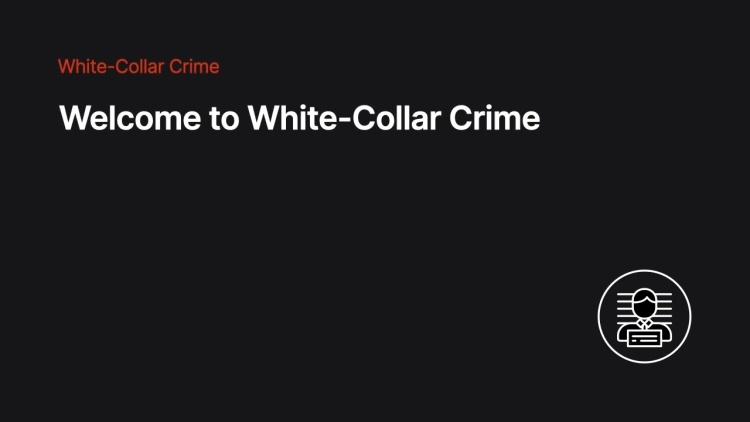Welcome to White-Collar Crime
A survey of the subset of criminal law related to crimes involving the nonviolent exploitation of a significant position or power for illegal gain resulting in financial, and possibly physical, harm to its victims.
Transcript
Welcome to White-Collar Crime! This course is designed for 2Ls and 3Ls and features nine chapters of lesson videos. The course generally covers crimes involving the nonviolent exploitation of a significant position or power for illegal gain, which results in financial and possibly physical harm to its victims.
Chapter two highlights some of the unique attributes that differentiate white-collar crime from other kinds of crime. This chapter reviews federal and state jurisdiction over white-collar prosecutions, the complexities of parallel civil, criminal, and administrative proceedings, actus reus and mens rea, and how individuals and institutions may be liable for white-collar crime.
Chapter three explores many of the federal statutes criminalizing dishonesty and fraudulent conduct. Topics include mail and wire fraud, two of the most commonly charged white-collar offenses. We’ll also cover bank fraud and healthcare fraud, perjury and false claims, and obstruction of justice, including efforts to destroy evidence, offer or encourage false testimony, and influence witnesses, jurors, or judges.
Chapter four examines criminal influence and the exploitation of positions of fiduciary responsibility. We’ll learn about public corruption crimes such as bribery of public and foreign officials, extortion, and securities fraud.
Chapter five discusses the specific federal laws used to prosecute financial crimes related to the handling and movement of money and other financial instruments. We’ll review the Bank Secrecy Act, currency-reporting offenses, money laundering, and tax crimes.
Chapter six explains other white-collar crimes involving a high level of complexity. These crimes often transcend geopolitical boundaries. Examples include computer crimes, environmental crimes, the theft of commercial trade secrets, and the interstate and foreign transportation of stolen goods.
Chapter seven dives into criminal activity involving the collaboration of individuals and institutions to promote a common criminal objective. We’ll investigate organized crime and the Travel Act, the ever-popular Racketeer Influenced and Corrupt Organizations Act, better known as RICO, and conspiracy.
In chapter eight, we’ll unpack the complex evidentiary, procedural, and constitutional issues implicated by the investigation and prosecution of white-collar crime. This chapter covers the unique characteristics of grand-jury investigations, as well as internal investigations and compliance programs. We’ll also address some of the Fifth Amendment issues particular to the white-collar crime context, including compelled testimony and document production.
Chapter nine examines important considerations in the defense of white-collar crime. For instance, we’ll learn about timing defenses to white-collar charges, including the Sixth Amendment right to a speedy trial and the federal Speedy Trial Act. We’ll also cover procedural and other defenses. Finally, we’ll talk about the penalties and consequences that follow a white-collar conviction, such as imprisonment, restitution, and criminal and civil forfeiture.
By the time you complete all nine chapters, you’ll have a solid understanding of white-collar crime and be ready to ace your final exam. Let’s go!




